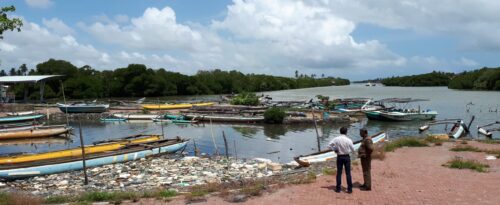Ocean Plastics Media Scan: September 2019

Fortune: Preventing Plastic Waste is a Global Crisis- and an Investment Opportunity
Investors and companies around the world are beginning to see the global plastics pollution crisis as an investment opportunity instead of a problem. Investment firms like Circulate Capital finance companies and infrastructure that prevent the flow of plastic waste into the ocean. Major companies like PepsiCo, Coca-Cola, and Dow are committed to reducing and re-purposing plastic waste and reshaping themselves on principles of sustainability. Pernod Ricard’s financial results last year were its strongest in over a decade, a success that leadership credits to the company’s environmental commitments.
National Geographic: Plastic Food Packaging was Most Common Beach Trash in 2018
Nine of the top ten items collected during Ocean Conservancy’s annual International Coastal Cleanup are relate to food and drink, with food packaging , plastic cutlery, bottles, cups, and plates all taking top spots on the list. For the first time, the 2018 clean up drew more than a million people, collecting over 23.3 million pounds of trash and cataloging nearly a million separate items. Ocean Conservancy is conducting an extended analysis of the cleanup data to identify patterns that could inform efforts to keep plastic trash out of the ocean.
The New Yorker: Where Does All the Plastic Go?
Of the eight million metric tons of land-based plastic that enters the ocean every year, scientists can only account for roughly one percent of that waste by measuring what is floating on the water’s surface. While some of this is due to plastic breaking down into nearly invisible microplastics, most of the waste humans pour into the ocean is missing. Dutch NGO Ocean Cleanup released a new study proposing that most plastic ends up stays stranded on shorelines and coastal areas or buried near coastlines under sand and rocks. If accurate, this study raises new questions and challenges for the plastics crisis, as most marine life of environmental and economic value is near the shore.
Fast Company: This New HP Laptop is the First Computer to Use Ocean-Bound Plastic
HP is the first to use ocean-bound plastic in a laptop computer. The plastic material, made from plastic bottles in Haiti, is found in the speaker enclosure of the new HP Elite Dragonfly. While the computer uses a relatively small amount of the ocean-bound plastic, this could signal a shift in how electronics companies source plastic for devices- by 2020, all new HP Elite and HP Pro desktop and notebook computers will incorporate material from these recycled bottles. In partnership with First Mile Coalition, HP has sourced more than 35 million plastic bottles from Haiti to use in its products.
World Economic Forum: 3 Ways We Are Making an Impact on Plastic Pollution
The Global Plastic Action Partnership (GPAP), a public-private collaboration platform hosted at the World Economic Forum, is piloting a new approach to effectively tackle the plastic pollution crisis in a few target locations. This approach is anchored on market-based solutions, national government partnerships, and the transition to a circular economy model for plastic production. After just one year of operation, GPAP has already secured three partnerships with the governments of Indonesia, Vietnam, and Ghana.
PR Newswire: TerraCycle Reports Second Quarter 2019 Financial and Operational Results
TerraCycle, an innovative company focused on recycling materials from generally non-recycled waste streams, announced financial results from its second quarter demonstrating revenues of $11.2 million. TerraCycle converts collected waste into raw materials that are sold to and used by manufacturers to create new products. Examples of waste streams recycled by the company include chip bags, coffee capsules, cigarette butts, oral care, beauty care, and writing utensils.
Business Wire: Municipal Solid Waste Management Market 2019-2023 ─ Increasing Urbanization to Boost Demand
A new report by Technavio states that the global municipal solid waste management market is poised to grow by more than $34 billion between 2019-2023. According to the report, the market is driven by increasing urbanization and the increasing need to reduce risks associated with environmental pollution. is anticipated to further boost the growth of the market during the forecast period.

